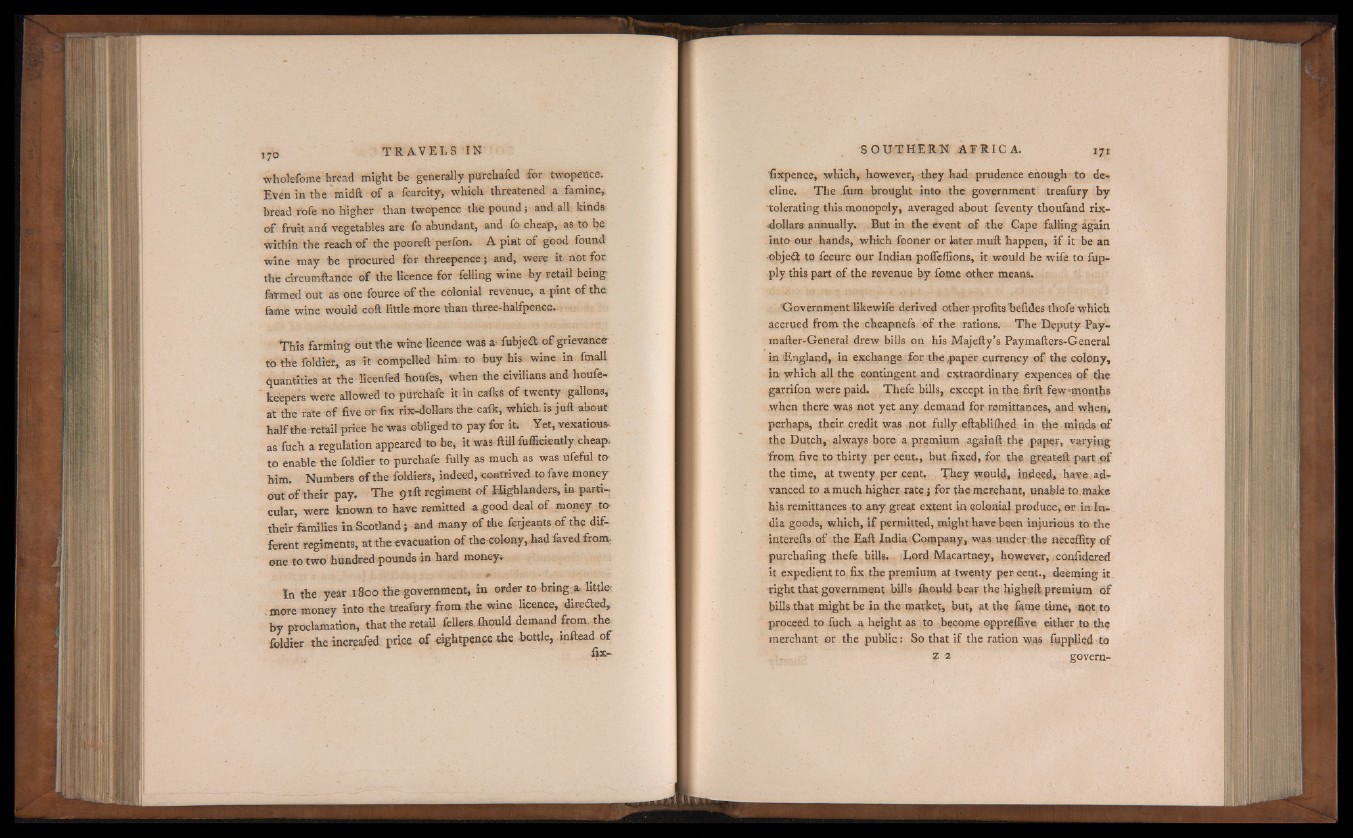
wholefome bread might be generally purchafed for twopence^
Even in the midft of a fcarcity, which threatened a famine*
bread role no higher than twopence the pound; and all kinds
of fruit and vegetables are fo abundant) and fo cheap, as* to be
Within the reach o f the pooreft perfon. A pint of good found
wine may be procured for threepence; and, were it not for
the circufnftatice of the licence for felling wine by retail being
farmed out as one fource of the colonial revenue, a pint of the
iame wine would coil little more than three-halfpence.
This farming out the wine licence was a fubjeit of grievance
to the foldier, as it compelled him to buy his wine in fmall
quantities at the licenfed houfes, when the civilians and houfe-
keepers were allowed to purchafe it in caiks of twenty gallons,
at the rate of five or fix rix-dollars the cafk, which, is juft about
half tiie-retail price he was obliged to pay for itt Yet, vexatious*
as fuch. a- regulation appeared to be, it was ftill fufficiently cheap.
to enable the foldier to purchafe fully as much as was ufeful to
him. Numbers of the foldiers, indeed, coarrived to fave mosey
out of their pay. The pnft regiment of Highlanders, in particular,
were known to have remitted a good deal of money to
their families in Scotland; and many of the ferjeants of the different
regiments, at the evacuation of the colony, had faved from
one to two hundred pounds in hard money.
In the year ,1800 the government, in order to bring little
more money into the treafury from the wine licence, direded,
by proclamation, that the retail fe lle r s , &ouU demand from, the
foldier the increafed pri.ee of eightpence the bottle, inftead of
fixfixpence,
which, however, they had prudence enough to decline.
The fum brought into the government treafury by
tolerating this monopoly, averaged about feventy thoufand rix-
dollars annually. Butin the event of the Cape falling again
into our hands, which fooner or later muft happen, if it be an
•objed to fecure our Indian pofleffions, it would be wife to fup-
ply this part of the revenue by feme other means.
'Government likewife derived other profits befides thofe which
accrued from the cheapnefs of the rations. The Deputy Pay-
mafter-General drew bills on his Majefty’s Paymafters-General
in England, in exchange for the paper currency of the colony,
in which all the contingent and extraordinary expences of the
garrifon were paid. Thefe bills, except in the firft fewmooths
when there was not yet any demand for remittances, and when,
perhaps, their credit was not fully eftabliihed in the minds cif
the Dutch, always bore a premium againft the paper, varying
from five to thirty percent., but fixed, for the greateft part of
the time, at twenty per cent, They would, indeed, have, advanced
to a much higher rate j for the merchant, unable to.make
his remittances-to any great extent in colonial produce,, or in India
goods, which, if permitted, might have been injurious to the
interefts of the Eaft India Company, was under the neceflity of
purchafing thefe hills. Lord Macartney, however, confidered
it expedient to fix the premium at twenty per cent., deeming it.
right that government bills fhould bear the higheft premium of
bills that might be in the market, but, at the fame time, not to
proceed to fuch a height as to become oppreflSye either to the
merchant or the public: So that if the ration was fupplied to
z 2 govern